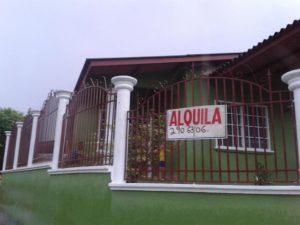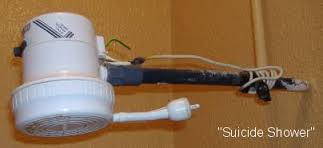 (Panama Relocation Tours) Renting a house or apartment in Panama is not like renting a property in North America or Europe. Many of the things you take for granted do not necessarily come with a property in Panama. You do not need a residency visa to rent in Panama. To find a rental, see the links to web sites listed below. However, many of the best rentals are NOT advertised on a web site or with a real estate agent; you will need to drive around looking for Se Aquile (For Rent) signs posted in front of the property.
(Panama Relocation Tours) Renting a house or apartment in Panama is not like renting a property in North America or Europe. Many of the things you take for granted do not necessarily come with a property in Panama. You do not need a residency visa to rent in Panama. To find a rental, see the links to web sites listed below. However, many of the best rentals are NOT advertised on a web site or with a real estate agent; you will need to drive around looking for Se Aquile (For Rent) signs posted in front of the property.
Rental prices depend in the area you select. Panama City, Coronado, Boquete and Boca Chica are some of the most expensive areas for rentals or home purchases. Other areas have more affordable rentals. I know a lady who rents a 1 bedroom house for $80 a month in Las Tablas. A couple has a 4 bedroom 4 bath house in Cerro Punta for $650 a month. A couple who has a nice 2 bedroom house in David for $220 a month. To get a condo in Coronado or a house in a gated community in Boquete you’ll spend closer to $1500 or more per month. If you don’t rent in a gated communities, you can find much better prices. A tour guest recently rented a great 1 bedroom house near Boquete for $425. I paid $600 a month for my 2 bedroom furnished rental when I moved to Panama. The further you are away from the town center (for highlands) or the beach (for coastal areas), the more affordable the prices will be. If you are on a tight budget, understand that some areas in Panama are much more affordable than others.
No matter which area you are considering, if you take your time to look around, and if you are flexible, you can find just what you are looking. The less things you have on your “must have” list, the easier it will be to find a rental. Some landlords will take pets. Some won’t. Some landlords will accept a family with children. Some won’t.
Here are some important things to take in to consideration before renting in Panama:
1. Don’t assume that there will be hot water at the property or that there will be hot water at all faucets. Some houses, especially in warmer areas, do not have a water heater. Some houses only have hot water in the shower, called a suicide shower, but no hot water at the kitchen sink or any other faucets. A suicide shower is an electrical device that hooks in to the shower faucet to heat up the water when it comes out. There are usually wires hanging out.. thus the name suicide shower. You don’t want to touch the wires or you could get an electrical shock. Ask if there is hot water at all faucets. |Most water heaters in Panama are on-demand water heaters which take some getting used to.
2. Just because a property is advertised with “high speed internet” does not mean it has what you would consider “high” speed. It is better to find out who the internet service provider is who services that area. If it is Cable and Wireless, you can get 4 Mb of internet speed for about $30 a month. If it is Cable Onda, you can get 7-15 Mb for $25-$50 a month. But if neither of those ISPs is available, you will be lucky to get 2 Mb and forced to pay $120 – $140 for Planet Telecom or MobileNet. Be warned that the properties with the best views rarely have the highest internet speeds. There are trade-offs!
3. It is important to rent a house which has a reserve water tank. Towards the end of the dry season, in April and May, there may be no, or low, water pressure. Some municipalities (especially the Azuero Pensinula) actually turn off water during part of the week when there is very low water pressure. The reserve water tank is usually a blue or black tank next to to the house, sometimes elevated, which will insure that you have constant water pressure throughout the year.
4. Never rent a house without seeing it first. The photo of the property may look great. But it may not show the neighbor who has 12 roosters who make noise all day long or the 4 barking dogs or the teenagers who have their boom box blaring all weekend. Before you decide to rent, you should visit the neighborhood at various times of the day and on the weekend so you can determine what the noise and traffic level is like.
5. If the property has a metal roof it will sound like a freight train is coming through your house when it rains. You won’t be able to hear the TV or radio or anyone talking to you. It is much better to get a house with clay or cement tile roof.
6. If the road to your house is not paved, you may have a hard time getting to the property in the rainy season. Dirt roads get washed out and/or get ruts so big that you will need a 4 wheel drive vehicle to get to the property.
7. Verify that the house has a washer and dryer. Some houses only come with a washer and a clothes line outside. A propane dryer will keep your utility costs down. A small propane tank is $5.37 and will last about 2 months.
9. Some houses come with a tiny 5’ tall refrigerator which will make it necessary to go to the grocery store every other day. Ask if there is a full size refrigerator.
10. Verify that your rental comes with cable TV if that is important to you. Cable Onda or SKY TV have 200+ channels including movies, CNN, Fox News, Animal Planet, etc. Some of the channels are in English all the time. Others channels have television shows in English some of the time or Spanish, German, or other languages. If Cable TV is not included in your rent, it will cost about $70 a month to get that service. Or, you could subscribe to USTVNow.com for about $10 a month. NetFlix.com, iTunes and Amazon shows are available too.
11. If you move to a warmer coastal area you will need air conditioning. Most of the houses will have an air conditioner unit mounted on the wall in the bedroom but there may not be a unit in every room. There will also be a compressor outside. Before you rent, run the unit to see how noisy it is and to verify that it cools the room. Central air conditioning is rare in Panama. Find out which rooms have an air conditioning unit. In the mountain areas it is rare that there will be an air conditioner unit at the property….you won’t need it!
12. Most single family house rentals come with a weekly or bi-monthly gardener. If the gardener service is not included in your rent, you will pay about $15-$20 per day for a gardener. Some rentals also come with weekly maid service. Ask what is included.
13. Always get a lease agreement in writing. Get it translated before you sign so you know exactly what you are agreeing to. Make sure the lease spells out what is included with the rent, like electricity, water, Cable TV, internet, gardener, etc. and the length of the lease and how rent will be paid. Many landlords give you their bank account number so you can make a CASH deposit in to the account to pay rent. Most landlords will not take a check or credit cards for rent.
14. Many rental properties come fully furnished with furniture, dishes, silverware, linens, television, etc. Get an inventory list of what comes with the property or create your own list then get your landlord to sign off on it. You may want to take pictures too.
15. How far is the property from town? Unless you buy or rent a car, you will need a rental property that is close to town. Close means about 1 mile (if you can walk one mile). You can rent a car for about $600 a month. If the property is not close to town, and you don’t want to rent or buy a car, you could take a taxi or the bus. The hassle factor and expense of taking a taxi or bus needs to be considered before you rent.
16. When renting a condo, find out what amenities are included with your rent. Also find out if there is a backup generator for the elevator and a working emergency call button. If you are living on the 25th floor and there is a power outage, you don’t want to carry groceries up 25 floors. One time we were touring a condo and the elevator stopped working. The emergency call button did not work and cell phones did not work in the elevator. Not good!
17. December through March are high season. It is harder to find a rental property during those months because there is less inventory. We have a lot of “snowbirds” from colder climates who come to Panama during high season. Some landlords jack up the rent prices during high season. If you come down when it is not high season, you will have much more selection and better prices too.
In Panama, it is customary and a good idea to get a short term rental for 1-6 months. Test drive the property before you sign a long term lease.
Normally you will be required to pay 1 month rent as a security deposit plus your first month’s tent. Rarely will a landlord require you to pay more than that to rent a property.
Tenants can legally get out of any lease with a 30 day notice. You may not get your security deposit back unless it is the end of your lease agreement, but you can get out of paying rent after your 30 day notice. This is another good reason to sign a short term lease initially.
Follow these tips when renting in Panama so you have no surprises of conflicts.
This may sound like it is more complicated to rent in Panama cut it is actually easier because so many properties come fully furnished. You only need to bring a suitcase with clothes and a toothbrush when you rent a fully furnished house.
The best way to find a rental it to talk to people who live in the area. Ask if they know about anything for rent in your price range. Finding rentals before they are advertised is how you find the best deals. Some real estate agents have information about rentals too. Some agents do not handle rentals.
Here are some websites where you can find rentals in Panama
http://www.viviun.com/Rentals/Panama/
http://panama.en.craigslist.org/search/apa?
http://playacommunity.com
http://boquete.ning.com/group/rental
http://www.encuentra24.com/panama-en/real-estate-for-rent
http://www.compreoalquile.com/
